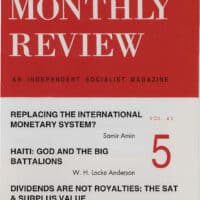-
Whither China?
An Exchange from 2002–03
-
The Political Tragedy of Capitalist Rule
Society is made up of parts that work together, sometimes more and sometimes less successfully, to produce its livelihood and reproduce itself.
-
The Puzzle of Financialization
In this reprise from October 1993, Harry Magdoff and Paul Sweezy ask: “Isn’t there anyone around here who understands how this capitalist system works?”
-
End of Cold War Illusions
In this reprint of the February 1994 “Notes from the Editors,” former MR editors Harry Magdoff and Paul M. Sweezy ask: “The United States could not have won a more decisive victory in the Cold War. Why, then, does it continue to act as though the Cold War is still on?”
-
Economist Harry Magdoff UVM lecture – the ‘Stock Market Crash’
Harry Magdoff at UVM on the Stock Market Crash. Intro by Abbas Alnasrawi. Sponsored by SPARC.
-
Remarks on Capitalism and the Environment It Produces
“Remarks on Capitalism and the Environment It Produces” is a recently discovered draft paper of Harry Magdoff’s. The exact date and location of its presentation is unknown; however the occasion was quite clearly a panel on economist Michael Tanzer’s The Sick Society (1971). We can therefore assume that it was written in 1971 or 1972. It is provided here in its original form with only minor copyediting. The title has been added. In our view, the chief importance of the paper is Magdoff’s early development of ecological ideas, ideas that are now much more common on the left.
-
A Dual Task
As we have pointed out on more than one occasion in this space, the government deficit is far from being a primary trouble spot. In fact it serves as an important counteracting force to the prevailing stagnation. On the other hand, the business community here and abroad sees the deficit, presumably because of its effect […]
-
The Federal Deficit: The Real Issues
. . . But are the high interest rates that impose such a heavy burden on the budget inevitable? What happened during the Second World War proves beyond a shadow of doubt that they are not. In the war years from 1942 to 1945, the average annual deficit was 23 percent of Gross National Product, […]
-
The Deficit, the Debt, and the Real World
The latest fad in business journalism is to sound the alarm about the United States having become the biggest debtor in the world. This is intended to bring visions of our country sliding into a third world-type debt trap. But even those who don’t draw such dire inferences nevertheless assume that a ballooning U.S. debt […]
-
Listen, Keynesians!
There is a remarkable consensus among economists of all ideological and political persuasions — conservative, liberal, and radical — that capitalist economies must grow to be healthy, and that the key to growth lies in the capital accumulation or savings-and-investment process. Accepting this view, we have long been arguing in effect that capitalism, like living […]
-
The Experience of China
[“The Experience of China” is an excerpt from “Approaching Socialism,” published in the July-August issue of Monthly Review in print. The full text of the article will be soon avaialbe at . — Ed.] When the Red Army, led by the Chinese Communist Party, entered Beijing in 1949, the work needed to create a road […]
-
Imperialism Today
On Saturday, May 3rd, 2003 Monthly Review and the University of Vermont co-sponsored “Imperialism Today,” a one-day conference in honor of Harry Magdoff. Invited speakers were asked to discuss the context and workings of the current U.S. global hegemony, the means by which control is exercised over resources and the global periphery, the maintenance of (and challenges to) ideological hegemony, and the prospects for anti-imperialism.





